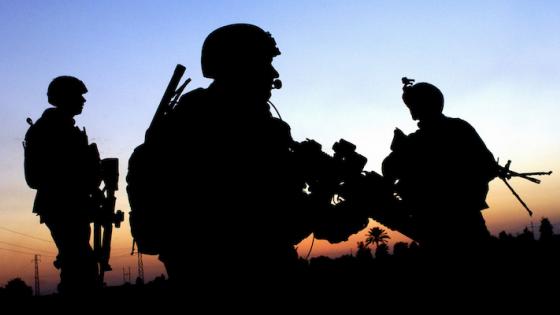The civil war in Syria has brought so much tragedy that events such as “Children killed as Syria regime bombs school in Idlib” are no longer reported in the major news media. It has brought more than 100,000 civilian deaths and made refugees out of another 13 million – more than half the population. Outside powers have intervened early and often “to alleviate the extreme humanitarian suffering of the Syrian people” in the words of the UK Government. This has not been short war – seven and a half years and counting. We see much the same in Yemen – a war now in its fourteenth year with no end in sight. By contrast the US Civil War and WWI lasted only four years, WWII lasted six years and the Korean War lasted three years.
Syria and Yemen are a tragedy. Surely something must be done! There is a substantial literature around the idea that major powers should intervene in conflicts for humanitarian reasons (see for example the 1993 paper by Adams). The UK is hardly unique – humanitarian concerns are a common justification used by powers when they do intervene. In a recent paper, we disagree both with this justification and with the idea that major powers do intervene for this reason. We argue that unless the intervention is so strong as to make conflict pointless (modern day Korea) or so weak that one side poses no threat (Gibraltar), it is bound to make conflict prolonged and painful. To make the obvious point: if the West did not prop up Assad’s opponents, he would scarcely need recourse to chemical weapons.
Prolonging conflict is costly for those involved in fighting. From the outside point of view, it does have the beneficial effect of preserving a balance of power – and reducing the threat to the interveners. This, we argue, is the most likely reason that countries intervene in conflict – humanitarian and moral reasons being merely a pretext.
To understand why conflict is sometimes prolonged and costly we must ask the fundamental question: why doesn’t one side win? It is characteristic of warfare that victory in battle weakens the opposition, making further victories easier. There are exceptions when geographical barriers are important – the French and German invasions of Russia failed despite initial successes due to the distance involved, and it is surely no mystery that over many millennia China and India have never fought a war. However, in regional conflicts over good terrain – absent outside intervention – typically one side eventually achieves enough success that it is ultimately able to win the war. Outright victory leads to peace. Examples of this are the Union victory in the US Civil War, the defeat of Napoleon and the defeat of Germany and Japan in the WWII. This is a theory that predicts – correctly – that China, geographically isolated from the rest of the world as it is, has spent most of its history in a hegemony ruled by a single central authority.1
It seems, then, that prolonged conflict is largely the consequence of outside intervention – and this has not gone unnoticed in geopolitical thought and policy. The role of England in maintaining a balance of power on the continent is well documented and notorious for its complete cynicism. From the rise of Spain following the discovery of America in 1492 to Brexit in 2016, British foreign policy has largely been aimed at preventing a hegemony in continental Europe. Entire books have been written on this topic and few discussions of European history fail to remark upon the striking fact that Britain consistently changed sides in conflicts to support the losing side. Most dramatic perhaps was the shift to an alliance with France – the enemy of a thousand years – in 1904 in the face of the German threat.
In our work, we distinguish three levels of intervention to prop up one side in a conflict. A weak intervention props up an opponent too small to be a real threat – so it is in Gilbraltar, where ‘conflict’ has raged for hundreds of years with the British preserving Gibraltar from the threat of the Spanish, but of course Gilbraltar is far too small to pose any threat to Spain. Such a ‘conflict’ is so low key that little harm is done.
On the opposite side, a very strong intervention on both sides leaves little scope for conflict – so it is in Korea, where technically the war has persisted since 1951 but both sides are so heavily reinforced by outside powers that there is no realistic chance of military success and so again the conflict is low key with relatively little harm done.
It is the in between that is a problem – when intervention in support of the losing side takes place only when the other side is prevailing but remains under threat. In that case the roles alternate and the conflict does not come to an end. The Vietnam War is a case in point, with the US intervening in sufficient strength to protect South Vietnam, but not enough to threaten the North, with the USSR doing the reverse. Naturally a bloody war raged until the intervention ended, at which point one side – the North – very quickly won.
In the following table taken from our paper, some notable cases of prolonged, bloody conflicts are listed. The table shows the region, the year in which the conflict began, the number of years it lasted, the parties involved and the time to end after outsiders left. Casualties (including civilian casualties) are reported in deaths per 100,000 per year which is the standard unit for reporting, for example, murder rates. To put these numbers in context, note that the overall murder rate for Europe and Asia is about 3, for the entire world about 6, and for Africa about 12 and for the Americas about 16.

If humanitarian concerns are truly predominant, then the only kind of intervention that can be justified is either weak or strong. The kind of medium intervention we see in Syria and Yemen – to prolong a war probably for decades – is difficult to justify on those grounds. The truth is that it is hard to believe that any non-Muslim power cares whether Sunni's or Shia's gain a hegemony – rather, they care that neither does, since at stake is the control of a substantial fraction of the world oil supply and from this point of view they are better off with a divided Muslim world.
To be clear, from the Western European point of view the costs due to the (probably unanticipated) flow of refugees have been high.2 What is hard to believe in any of these conflicts is that the behavior of the interveners was motivated by moral considerations of peace and prosperity for the unfortunate inhabitants of these areas – in Sudan, Lebanon, and Syria, it is hard to reconcile humanitarian words with the actual behavior of the intervening powers. Humanitarian reasons dictate that outside powers should either go in hard enough to put an end to the war or stay out.
Endnotes
[1] We make this point in a 2016 paper. In a more recent paper, we discuss why the same did not happen in Europe and India.
[2] One might also cynically note that from the German perspective the cost is perhaps not so high as they have taken advantage of the refugee flow to remedy their difficult demographic situation by skimming the cream of Syrian human capital.



